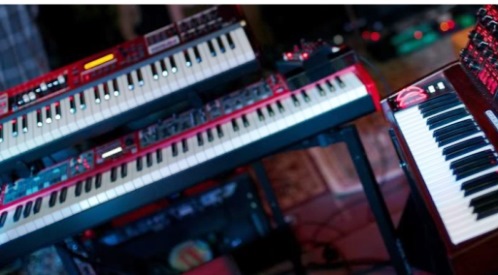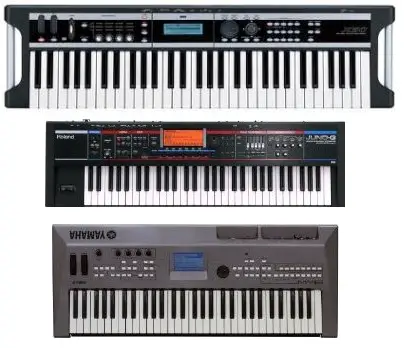
Yamaha vs Roland vs Korg Synth Keyboards: Which one is better?
If you are looking for a 61-key music synthesizer keyboard, mostly for studio work, you’re most likely to run into a Korg, Roland or a Yamaha synth.

However, when looking for such advanced synthesizer keyboards, you should also have an idea of what type of sounds and what styles of music you will be working with. Is it going to be more of pop / jazz / acoustic type of sounds, or more of techno, or for rock music, and so on.
Some of the popular entry-level synth keyboards for such purposes include the likes of Korg X-50, Yamaha MM6 and the Roland JUNO-G 61-Key Synthesizer Keyboards.
The beauty of these synth keyboards (from all the major brands) is that they are the scaled down versions of their flagship synth workstations. So for example, Korg X-50 and the Yamaha MM6 are scaled down versions of the triton and the motif and so on.
In recent times, several better synths have been introduced by all these three brands (Korg, Roland, Yamaha).
Here are some of the comments that we received from readers on our poll – “Korg vs Yamaha vs Roland Synth Keyboards: Which is Better?”. In general, most of these comments also apply to most of the synth keyboards from these brands.
Best Overall Sounds – KORG X50 vs ROLAND JUNO vs Yamaha MM by: Jaylyric
It really depends on what you are looking for. If you are looking for a main keyboard (just pianos/rhodes piano patches), the Yamaha MM is the way to go.
Most Korg pianos are disgustingly thin…Roland has great pianos only when you start to upgrade to Phantom series or the newer Roland keyboards.
However, with that being said…, if you bought the Roland Juno, you can always upgrade the board with strings, pianos, etc.
Korg has the best motion pads, ambient patches…really full and thick patches that sound heavenly during a live concert/show.
The one feature that I like about the Roland Juno is that you can layer sounds and control each individually with the faders. You can place the piano on one fader, strings on another, motion pad on another, etc. It’s set up kind of like the Motif series keyboards. That is the greatest feature that you can have. If you layer sounds right, you can even make the thinnest of keyboards sound great.
The Yamaha MM8 has the greatest feel of all 3 boards…Winner in the Piano category goes to the Yamaha MM8. Winner for best overall sounds goes to Korg X50, followed by Roland Juno…MM8 being last.
I have owned Yamaha MM6 and Korg X50 before by: Mike
I have had the pleasure of owning both – Yamaha MM6 and Korg X50 61 key synthesizer keyboards, and I feel they both have their strengths and weaknesses.
I have always owned a Yamaha keyboard ever since I started playing keyboards, so I have a natural affinity towards Yamaha.
Korg X50 Synthesizer Keyboard
Strengths: This is more impressive than the Yamaha MM6, especially when it comes to the effects and combis. You get brilliant ambient patches and a huge sounds palette, which are fully editable. 64-note polyphony.
Against: Acoustic sounds, especially the piano sound is very average. Very small LCD screen so it is difficult to read and see the selections.
The learning curve on Korg keyboards is more compared to the Yamaha mm6.
Yamaha MM6 Synthesizer Keyboard
Strengths: Easy-to-use and the large screen makes it easier to navigate. The acoustic instruments sounds, including the piano are very good. All the regular use sounds are good. Nice arpeggiators and patterns!
Against: The 32 note polyphony is low for a comparatively high end keyboard. No monophonic mode, no portamento, and minimal editing features. Too many unnecessary filler sounds (sirens, barking dogs, etc.), would have been better if they had provided more ambient patches. Besides, you cannot name your performances, if you decided to save them.
In spite of the limitations, I will go with the Yamaha MM6 Synthesizer Keyboard because of its ease-of-use.
No views on the Roland JUNO-G 61-Key Synthesizer Keyboard though.
Roland Juno vs. Korg x50 vs. Yamaha mm6 – Studio use or gigging? by: rich
I too narrowed my search to these 3 boards – Roland Juno, Korg x50 and Yamaha mm6 synthesizers.
Roland Juno:
Although I love Roland products (Owner of Fantom X) the Juno didn’t cut it for me. Piano was the best out of all 3 in my opinion, but the small screen, small size of the keys and weaker sounds dropped this to 3rd on my list.
Korg x50:
I have never owned a Korg mainly because I HATE their piano sounds. But other than that, this board has the best sounds if all 3. In a studio environment, i’d buy this board. My only other complaint other than piano sounds is ease if use/ navigation and small screen. I needed a board to gig with and the ability to change sounds and split or layer on the fly is impossible with this board.
Yamaha mm6:
For gigs, this board was my choice. I love this thing. It’s very light, sounds are almost as good as the korgx50. But it’s so easy to use. Did I say how easy this board is to use? I can split and layer any sound in seconds. You can save the performance for 1 touch easy access. My complaints are, the piano sounds. Why no natural piano? Or even the piano patch that’s in the Yamaha XS? The Piano sound in the mm6 is dull, has no life to it. No portemento, no chorale/tremolo switch on organ patches. And low polyphony.
But it has a nice size and easy to read screen, and for the price, I’m glad I bought it. If the piano sounds were better, I’d buy the 88 key keyboard model to complete my setup as I’m shopping for another board.
Question:
Yamaha MOX vs Korg M50 vs Roland Juno Gi…
I have a Korg M50 for some time now and intend to change to something better (the Korg M50 is okay in terms of the sound-set and the editing features. I know the Korg M3 is far better but don’t have the budget. The Yamaha MOX6 sounds impressive, but I have no idea about the Roland Juno Gi. Can I have some experts opinion please here on the pros and cons of each. – PRK (United States)
Answers:
Though sound can be a very subjective thing, here’s what I think about these boards. The Yamaha MOX offers a bit of everything, has good acoustic sounds, is easy to use, and is also lightweight. If you like the Motif sound, you’ll also in most probability like the MOX sounds.
The Roland Juno Gi on the other hand has some cool presets, has a vocoder, and is also lightweight. You can’t load samples however, and its more on par with the MOX6 for me. Some however don’t like the Roland sound, but that again is personal choice.
I think the Juno Gi, along with a board such as the Kronos, will form a great combination because of their complementary sound-set.
The Gi sound is based more on the Fantom G, internal editing is easy, and the BOSS effects that can be used both internally and externally.
Besides, you can expand the sounds of JUNO; just checkout the SRX collection and you’ll be amazed by the sounds.
Those who have been gigging for long will also vouch for Roland’s solid construction; it just feels solid.
Personally, I think the Korg M50 is among the best hardware workstation that you’ll get for around 1,000 dollars. It comes with excellent sound quality, programs, effects & sequencer.
As far as the authentic sounds and expansions are concerned, for this price range, its anyways difficult to find authentic piano sounds and the keyboard may not have adequate processing power to adequately support the upgrades.
So in that regard, the Juno doesn’t capture my attention, and I would go for the Korg M50. If you can stretch the budget, a much more powerful option would be the Korg M3. – Suresh
Hope all these reviews were useful to you!
useful Synthesizer Review Links
- Best synthesizer keyboards under $700
- Best synth keyboards under $1000
- Best Music Workstation Keyboards
- Best digital stage pianos for professionals
KeytarHQ editorial team includes musicians who write and review products for pianists, keyboardists, guitarists & other musicians. KeytarHQ is the best online resource for information on keyboards, pianos, synths, keytars, guitars and music gear for musicians of all abilities, ages and interests.



Leave a Reply